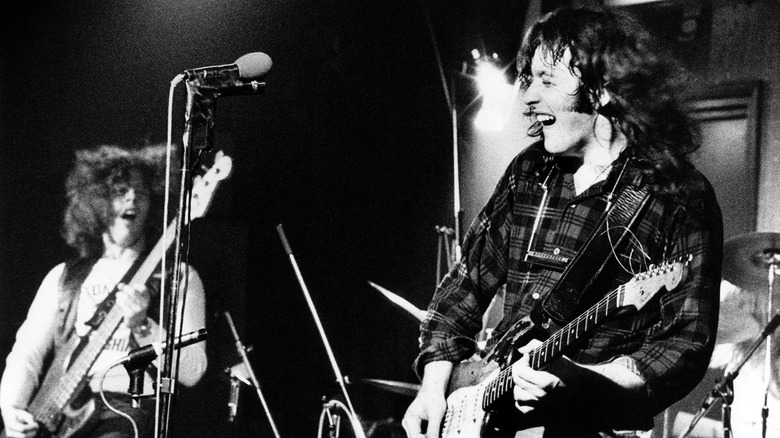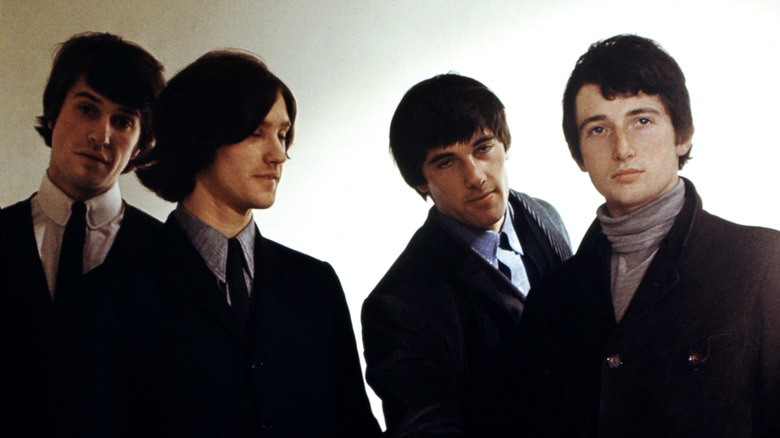5 Rock Songs From 1970 That Are So Underrated
Whatever generation you're from, you likely get to a certain age where the music younger people listen to begins to sound, well, unlistenable. To some ears, modern rock sounds derivative, most pop sounds too bombastic, and other genres, such as glitch and vaporwave, may seem utterly unfathomable. Is it true that music was better in the old days?
It's a question that has attracted a great deal of debate down the years. It's true that, with rock music at least, the pioneering bands of the past have stood the test of time. Acts from the 1970s such as Led Zeppelin, The Eagles, Pink Floyd, Queen, Fleetwood Mac, and Black Sabbath are considered to have made some of the most definitive music of the era, which continues to resonate with generations of new audiences interested in listening to the greats and uncovering the roots of modern rock. Looked at through this lens, it seems the music of the era is both classic and timeless.
But the fact is that while certain songs retain their listenership down the decades, there was also a great deal of dross that doesn't deserve to be remembered; indeed, with music-making more accessible to a greater number of people, it's arguable that there is more "good" music being made today. But there is plenty of music that fails to find the audience it deserves, and the same was true in the '70s. Here are five songs from 1970 alone that are severely underrated today.
Spirit – Animal Zoo
Amid the heavier direction that rock music was going in during the early 1970s, it is easy to forget how playful much of the music of the era was. One fun and catchy track from 1970 that didn't get the attention it deserved was Spirit's "Animal Zoo," a track from their album "Twelve Dreams of Dr. Sardonicus," which languished at No. 97 on the Billboard Hot 100 for just a single week in September that year.
The track was released during a period of turmoil for the Los Angeles-based group, which had formed in 1967. Just months before, frontman Randy California had suffered a fractured skull during a riding accident that had thrown off the band's recording and touring schedule, and their releases around this time failed to make a commercial breakthrough. Nevertheless, the song stands alongside other, more successful psychedelia-infused pieces of the period, and includes some especially entertaining vocal performances.
That Spirit is an unfairly underrated band is exemplified by the fact that they were a major influence for one of the biggest bands of the day — Led Zeppelin — but attracted a fraction of that group's acclaim and commercial success. Indeed, Zeppelin's totemic signature song "Stairway to Heaven" has as its introduction a passage inspired by (or arguably stolen from) Spirit's song "Taurus." But who said the music industry was fair?
The Pretty Things – Cries From the Midnight Circus
On paper, at least, The Pretty Things were one of the most respected bands of the British Invasion. They received wide coverage in the music press, were well connected with other acts of the era, and toured widely. However, though formed back in 1963, their reputation didn't translate into sales the way it did for bands such as The Rolling Stones, and they languished in relative cult status for much of their career.
By 1970, The Pretty Things were looking to expand their sound in the way many veterans of the previous decade had. The released and "Abbey Road"-akin album called "Parachute," the first half of which contains an expansive medley of tunes that segues into an extended psych jam, "Cries From the Midnight Circus." The track, which features an exceptional bass part by Wally Allen and an irresistibly full-bodied vocal from Phil May, ranks among the best of British psychedelia but is sadly overlooked in favor of the work of bigger acts of the same era.
The Kinks – Strangers
Though considered an important and influential rock band today, the Kinks had a checkered career when compared to many of the British Invasion bands of the period. This was mainly due to ongoing tensions within the band, especially between brothers Ray and Dave Davies, whose frequent physical altercations led to them being denied visas to tour the United States, which had a major impact on their ability to make the most of the enormous American rock market.
Of course, the Kinks did have many international hits, including their early garage-infused stompers "You Really Got Me" and "All Day and All of the Night," which have been touchstones for indie guitar bands for more than 60 years. Some of their more mature work, such as 1966's "Sunny Afternoon" and 1967's "Waterloo Sunset," were huge hits at the time and continue to be appreciated as some of the finest songs to emerge from the era.
All of the Kinks' major hits were written by Ray Davies, but amid the acclaim he received for being one of the best songwriters of his generation, the talents of his brother Dave were often overlooked. "Strangers," an album track from the 1970 studio album "Lola Versus Powerman and the Moneygoround, Pt. 1," is well regarded among Kinks fanatics as perhaps Dave Davies' masterpiece. Though it wasn't selected as a single — that honor went to Ray's "Lola" — the song, whose lyrics reportedly refer to a school friend of Dave's who suffered an overdose, is quietly affecting and weighty in a way few songs from the Kinks' catalog are.
Taste – I'll Remember
Irish blues rocker Rory Gallagher is remembered as one of the finest guitarists to ever come out of the British Isles. He commanded a huge commercial appeal, selling more than 30 million albums across the world by the time of his tragic death in 1995 at the age of just 47. His career was also notable for his extensive touring schedule, with Gallagher establishing himself as a solo performer who was a major live draw from the 1970s until the 1990s.
While Gallagher's work as a solo artist is widely respected by blues enthusiasts and casual fans, the early period of his career is generally more overlooked. He was a founding member of blues-rock group Taste, a trio that very much modeled its sound on that of British blues rock titans Cream but enjoyed little of that band's commercial success. Nevertheless, much of the music Gallagher made during the 1960s and very early 1970s is worth exploring, and "I'll Remember," a satisfying power rock track that features Gallagher matching his vocal and guitar lines to playful effect, is perhaps the one song from their short two-album discography that asks to be, well, remembered.
Ten Years After – 50,000 Miles Beneath My Brain
Arguably no longer a musical touchstone among younger '70s rock listeners, Ten Years After was a successful live act and studio prospect from the late 1960s onward which continues to tour today and commands a loyal listenership. They gained momentum after appearing on the line-up of the Woodstock festival in 1969, after which they spawned a hit album, 1969's "Ssssh," which went to No. 20 on the Billboard 200 chart. They followed up quickly with two albums in 1970, "Cricklewood Green" and "Watt," which today are somewhat overlooked among listeners to their discography, at least according to streaming platforms. (Their 1971 song "I'd Love to Change the World" has nearly 200 million listens on Spotify alone.)
An extended blues jam that exhibits the energy and dynamism that made Ten Years After such a hit at Woodstock (they were included in the famous concert film that made the festival legendary), "50,000 Miles Beneath My Brain" from "Cricketwood Green" is a must-listen for anyone wondering what a musical freakout sounded like back in 1970. Don't let the sweet introductory bars fool you; this one goes hard.
How these songs were chosen
All of the bands listed above could be said to have enjoyed at least a reasonable amount of success during the early 1970s. None of them broke up before their albums were released, and they each enjoyed considerable success with at least a handful of commercial releases.
However, the songs above go together simply for being overlooked nowadays when compared to those songs that today define the year 1970. In the case of Spirit, The Pretty Things, and Taste, the artists were overshadowed by larger acts — Led Zeppelin, The Rolling Stones, and Cream respectively — by whom they may indeed have been influenced. However, that doesn't mean their music is less deserving of a continued listenership, and revisiting the lesser-appreciated work of these acts can give rock fans a greater depth of understanding of the texture of rock music at this crucial point in its history.
In the case of The Kinks, Dave Davies was overshadowed by his brother's talent, and their wider discography is arguably not as appreciated as it ought to be in the United States due to the restrictions put upon them during their careers. And when it comes to Ten Years After's "50,000 Miles Beneath My Brain," the song remains relatively little known to modern rock fans despite being emblematic of the blues jams that dominated the musical landscape in 1970, and is definitely deserving of a wider audience today.

